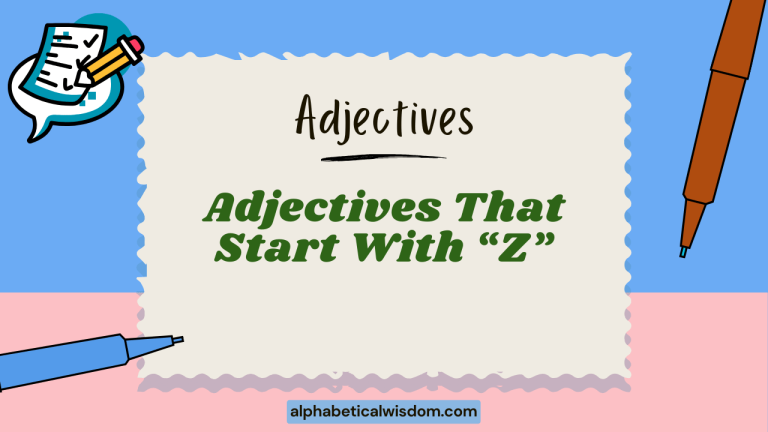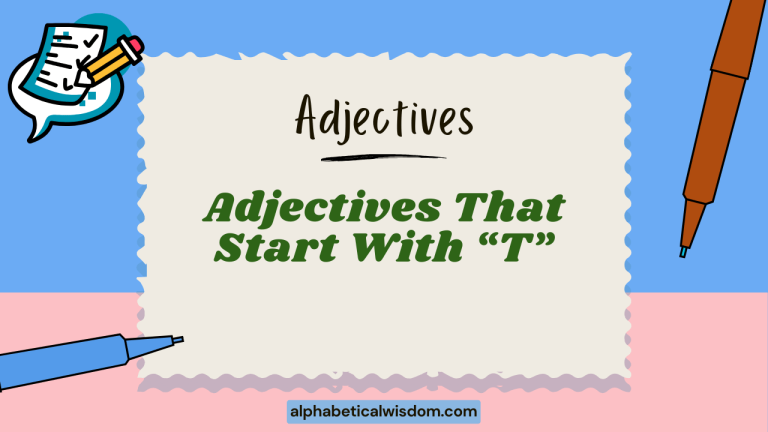Adjectives That Start With U: Usage, Examples, and Exercises
Adjectives are essential components of the English language, enriching our descriptions and providing nuanced detail. Mastering adjectives, particularly those starting with specific letters, can significantly enhance both written and spoken communication.
This article focuses on adjectives that begin with the letter “U,” exploring their meanings, usage, and structural patterns. Whether you are an English language learner, a student preparing for an exam, or simply someone who enjoys expanding their vocabulary, this guide will provide you with a comprehensive understanding of “U” adjectives.
Table of Contents
- Introduction
- Definition of Adjectives
- Structural Breakdown
- Types and Categories of “U” Adjectives
- Examples of “U” Adjectives
- Usage Rules for “U” Adjectives
- Common Mistakes with “U” Adjectives
- Practice Exercises
- Advanced Topics
- FAQ
- Conclusion
Definition of Adjectives
An adjective is a word that modifies a noun or pronoun, providing more information about its qualities, characteristics, or attributes. Adjectives answer questions such as “What kind?”, “Which one?”, “How many?”, and “How much?” They are crucial for creating vivid and detailed descriptions, making writing and speech more engaging and precise. Adjectives enhance clarity by specifying particular features or properties of the nouns they modify. For example, instead of saying “a car,” we might say “a red car,” where “red” is the adjective that adds detail.
Adjectives can be classified based on their function and the type of information they provide. Some adjectives describe physical attributes like color, size, or shape.
Others indicate quantity, origin, or a specific quality associated with the noun. Understanding the different types of adjectives helps in using them effectively and accurately.
Structural Breakdown
Adjectives typically precede the nouns they modify, but they can also follow linking verbs such as “is,” “are,” “was,” “were,” “seem,” “become,” and “appear.” When used before a noun, the adjective is called an attributive adjective. When used after a linking verb, it is called a predicative adjective. The structure of a sentence often dictates the placement of the adjective.
For example:
- Attributive: The unique painting hung in the gallery.
- Predicative: The painting is unique.
Many adjectives can form comparative and superlative degrees to indicate different levels of intensity. Comparative adjectives compare two things (e.g., “larger”), while superlative adjectives compare three or more things (e.g., “largest”).
These forms are usually created by adding “-er” and “-est” to the adjective, or by using “more” and “most” before the adjective.
Types and Categories of “U” Adjectives
Adjectives, including those starting with “U,” can be categorized based on the type of information they convey. Here are some common categories:
Descriptive Adjectives
Descriptive adjectives describe the qualities or characteristics of a noun. They provide details about appearance, personality, or other observable attributes.
For example, “unusual,” “ugly,” and “upbeat” are descriptive adjectives.
Quantitative Adjectives
Quantitative adjectives indicate the quantity or amount of a noun. While not many “U” adjectives fall directly into this category, some can imply quantity in certain contexts.
For example, “unlimited” suggests a quantity without bounds.
Proper Adjectives
Proper adjectives are formed from proper nouns and are always capitalized. They describe something as being related to that proper noun.
While there aren’t many common proper adjectives starting with “U”, one could potentially coin phrases using “U” to refer to specific organizations or initiatives if the context warrants it. Examples of proper adjectives in general include “American,” “French,” and “Victorian.”
Examples of “U” Adjectives
Here are some examples of adjectives that start with the letter “U,” categorized for clarity:
Common “U” Adjectives
These are adjectives that are frequently used in everyday language.
The following table provides examples of common “U” adjectives used in sentences. It includes the adjective, the sentence in which it is used, and a brief explanation of the adjective’s meaning in that context.
This will help clarify the usage and meaning of each adjective.
| Adjective | Sentence | Explanation |
|---|---|---|
| Ubiquitous | The internet has become ubiquitous in modern society. | Present, appearing, or found everywhere. |
| Ultimate | Winning the championship was the ultimate goal. | Being or happening at the end of a process; final. |
| Unable | I am unable to attend the meeting tomorrow. | Not having the skill, strength, or opportunity to do something. |
| Unacceptable | His behavior was completely unacceptable. | Not satisfactory or allowable. |
| Unaccountable | The unaccountable delay frustrated everyone. | Unable to be explained or justified. |
| Unaffected | She remained unaffected by the criticism. | Not influenced or changed by something. |
| Unanimous | The decision was unanimous among the committee members. | Fully in agreement. |
| Unavoidable | The accident was unavoidable due to the icy conditions. | Impossible to avoid or prevent. |
| Unbelievable | The magician performed an unbelievable trick. | Difficult to believe; incredible. |
| Unbiased | The journalist provided an unbiased report. | Showing no prejudice for or against something; impartial. |
| Uncertain | The future remains uncertain. | Not able to be relied on; not known or definite. |
| Unclear | The instructions were unclear, leading to confusion. | Not easily or clearly understood or expressed. |
| Uncommon | It is uncommon to see snow in July. | Not often found or seen; rare. |
| Unconditional | A mother’s love is often unconditional. | Not subject to any conditions. |
| Unconscious | He was found unconscious after the accident. | In a state of not being aware of and responsive to one’s surroundings. |
| Underground | The underground railroad helped slaves escape. | Located or operating below the surface of the ground. |
| Underlying | The underlying cause of the problem was poor communication. | Situated under something; fundamental. |
| Understandable | His frustration was understandable given the circumstances. | Able to be understood. |
| Undisturbed | The forest remained undisturbed by human activity. | Not interrupted or interfered with. |
| Uneasy | She felt uneasy about the upcoming trip. | Causing or feeling anxiety; troubled or uncomfortable. |
| Unequal | The distribution of wealth is often unequal. | Not equal in quantity, size, degree, or value. |
| Unexpected | The rain was unexpected this morning. | Not expected or regarded as likely to happen. |
| Unfair | It’s unfair to judge someone without knowing the facts. | Not based on or behaving according to principles of equality and justice. |
| Unforgettable | The concert was an unforgettable experience. | Impossible to forget; memorable. |
| Unfortunate | It was an unfortunate accident. | Having or marked by bad luck; unlucky. |
| Unhappy | He seemed unhappy with the outcome. | Not happy; sad. |
| Unique | Each snowflake is unique. | Being the only one of its kind; unlike anything else. |
| United | The team stood united against the challenge. | Joined together politically; characterized by unity. |
| Universal | Music is often considered a universal language. | Relating to or done by all people or things in the world or in a particular group; applicable to all cases. |
Uncommon “U” Adjectives
These adjectives are less frequently used but can add precision and sophistication to your language.
The following table provides examples of less common “U” adjectives used in sentences. Each entry includes the adjective, the sentence, and an explanation providing context for its usage.
This helps showcase how these adjectives can be used in different situations.
| Adjective | Sentence | Explanation |
|---|---|---|
| Umbrageous | The umbrageous trees provided welcome shade. | Providing shade; shady. |
| Unctuous | The unctuous salesman tried to flatter the customer. | Excessively flattering or ingratiating. |
| Underhand | He employed underhand tactics to win the election. | Acting or done secretly or dishonestly. |
| Underivative | The artist’s style was surprisingly underivative. | Not taken or copied from someone or something else. |
| Unearthly | The music had an unearthly quality. | Mysterious or frightening; unnatural. |
| Ungainly | The giraffe moved with an ungainly grace. | Awkward; clumsy. |
| Unguent | The unguent balm soothed her skin. | Relating to an ointment or salve. |
| Unhackneyed | The writer produced an unhackneyed plot. | Not made commonplace or stale by overuse. |
| Unilateral | The decision was made on a unilateral basis. | Performed by or affecting only one person, group, or country involved in a particular situation, without the agreement of another or the others. |
| Unlimited | The buffet offered unlimited refills. | Not limited or restricted in terms of number, quantity, or extent. |
| Unliterary | The unliterary style of the report made it accessible to everyone. | Not characteristic of or appropriate to literature. |
| Unostentatious | The billionaire lived an unostentatious life. | Not displaying wealth, knowledge, etc., in a way that is meant to attract attention, admiration, or envy. |
| Unplumbed | The ocean depths remain unplumbed. | Not fully explored or understood. |
| Unqualified | He was unqualified for the job. | Not officially recognized as being trained to perform a particular job; not having the required qualifications. |
| Unregenerate | The unregenerate sinner refused to repent. | Not reformed; wicked. |
| Unremitting | The unremitting pressure led to burnout. | Never relaxing or slackening; incessant. |
| Unscathed | He emerged from the accident unscathed. | Without suffering any injury, damage, or harm. |
| Unseemly | His behavior at the party was unseemly. | Not decent or appropriate. |
| Unsettled | The political situation remained unsettled. | Not stable or secure; disturbed. |
| Unsullied | The snow was unsullied by footprints. | Not spoiled or made impure. |
| Untenable | His position became untenable after the scandal. | Not able to be maintained or defended against attack or objection. |
| Untoward | Nothing untoward happened during the trip. | Unexpected and inappropriate or inconvenient. |
| Unversed | He was unversed in the art of negotiation. | Not experienced or skilled in. |
| Upmarket | The store sells upmarket clothing. | Relatively expensive or of high quality. |
| Uproarious | The comedian told an uproarious joke. | Provoking loud laughter; very funny. |
| Urbane | He was an urbane and sophisticated gentleman. | (of a person) suave, courteous, and refined in manner. |
| Usurious | The usurious interest rates were exploitative. | Relating to the practice of lending money at unreasonably high interest rates. |
| Utilitarian | The design was purely utilitarian. | Designed to be useful or practical rather than attractive. |
| Utopian | The community aimed to create a utopian society. | Modelled on or aiming for a state in which everything is perfect; idealistic. |
Usage Rules for “U” Adjectives
Using adjectives correctly involves understanding their placement, forms, and agreement with the nouns they modify.
Placement of Adjectives
Adjectives usually come before the noun they modify. Multiple adjectives can be used to describe a single noun, often following a specific order (e.g., opinion, size, age, shape, color, origin, material, type, purpose).
However, predicative adjectives follow linking verbs.
For example:
- Attributive: A beautiful, large, old, round, blue, Italian, leather bag.
- Predicative: The bag is beautiful.
Comparative and Superlative Forms
Most adjectives can form comparative and superlative degrees. Short adjectives typically add “-er” and “-est” (e.g., “uglier,” “ugliest”), while longer adjectives use “more” and “most” (e.g., “more unbelievable,” “most unbelievable”).
Some adjectives have irregular forms (e.g., good, better, best).
For example:
- Comparative: This solution is more understandable than the previous one.
- Superlative: That was the most unique experience of my life.
Use with Articles
Adjectives are often preceded by articles (“a,” “an,” “the”). The choice of article depends on the noun being modified and the context.
“A” is used before consonant sounds, “an” before vowel sounds, and “the” before specific or unique nouns.
For example:
- A unique opportunity.
- An unusual event.
- The ultimate decision.
Common Mistakes with “U” Adjectives
Common mistakes include incorrect placement of adjectives, misuse of comparative and superlative forms, and incorrect use of articles.
Here’s a table illustrating common mistakes and their corrections:
| Incorrect | Correct | Explanation |
|---|---|---|
| The opportunity unique. | The unique opportunity. | Adjectives usually precede the noun. |
| More uniquest experience. | The most unique experience. | “Unique” does not take “-est”; use “most.” |
| A unbelievable story. | An unbelievable story. | Use “an” before a vowel sound. |
| The decision unanimous. | The unanimous decision. | Adjectives usually precede the noun. |
| Most understandable solution. | The most understandable solution. | Adding “the” makes it specific. |
| An universal truth. | A universal truth. | Use “a” before a consonant sound. |
Practice Exercises
Test your understanding with these exercises:
Exercise 1: Identifying Adjectives
Identify the adjectives in the following sentences.
| Question | Answer |
|---|---|
| 1. The unforgettable journey left a lasting impression. | unforgettable |
| 2. She wore an unusual hat to the party. | unusual |
| 3. The ultimate prize was a trip around the world. | ultimate |
| 4. His unacceptable behavior resulted in a warning. | unacceptable |
| 5. The underground tunnel was dark and mysterious. | underground |
| 6. The uneasy feeling persisted throughout the night. | uneasy |
| 7. The united team celebrated their victory. | united |
| 8. The urbane gentleman charmed everyone he met. | urbane |
| 9. The unbiased report presented all sides of the issue. | unbiased |
| 10. The uncommon flower bloomed in the spring. | uncommon |
Exercise 2: Using Adjectives in Sentences
Use the following adjectives in original sentences: ubiquitous, unable, uncertain, unfair, unhappy.
| Adjective | Sentence |
|---|---|
| ubiquitous | Smartphones have become ubiquitous in modern life. |
| unable | Due to the storm, we were unable to travel. |
| uncertain | The weather forecast remains uncertain for the weekend. |
| unfair | It is unfair to judge someone based on rumors. |
| unhappy | He seemed unhappy with the decision. |
Exercise 3: Fill in the Blanks
Fill in the blanks with the most appropriate adjective from the list: ultimate, unacceptable, unavoidable, unbelievable, universal.
| Question | Answer |
|---|---|
| 1. The ________ goal is to achieve world peace. | ultimate |
| 2. His disrespectful behavior was completely ________. | unacceptable |
| 3. The delay was ________ due to the weather conditions. | unavoidable |
| 4. The magician performed an ________ trick. | unbelievable |
| 5. The need for clean water is a ________ human concern. | universal |
Advanced Topics
For advanced learners, understanding the nuances and idiomatic uses of adjectives can greatly improve language proficiency.
Nuances in Meaning
Some adjectives have subtle differences in meaning that can significantly alter the tone and context of a sentence. For example, “unique” strictly means “one of a kind,” but it is sometimes used informally to mean “special” or “unusual.” Understanding these nuances is crucial for precise communication.
Idiomatic Expressions
Adjectives are often used in idiomatic expressions, where their meaning may not be immediately obvious from their literal definitions. For example, “under the weather” means “feeling unwell.” Familiarity with these expressions can enhance comprehension and fluency.
Here’s a table with examples of idiomatic expressions using “U” adjectives:
| Idiom | Meaning | Example |
|---|---|---|
| Under the weather | Feeling ill | I’m feeling a bit under the weather today, so I’m staying home. |
FAQ
Here are some frequently asked questions about adjectives:
- What is the function of an adjective?
An adjective modifies a noun or pronoun, providing more information about its qualities, characteristics, or attributes. It answers questions such as “What kind?”, “Which one?”, “How many?”, and “How much?”
- Where are adjectives typically placed in a sentence?
Adjectives usually come before the noun they modify (attributive adjectives). However, they can also follow linking verbs (predicative adjectives).
- How do you form the comparative and superlative degrees of adjectives?
For short adjectives, add “-er” and “-est.” For longer adjectives, use “more” and “most.” Some adjectives have irregular forms.
- What are proper adjectives?
Proper adjectives are formed from proper nouns and are always capitalized. They describe something as being related to that proper noun (e.g., American, French).
- Can multiple adjectives be used to describe a single noun?
Yes, multiple adjectives can be used, often following a specific order (e.g., opinion, size, age, shape, color, origin, material, type, purpose).
- What is the difference between attributive and predicative adjectives?
Attributive adjectives come before the noun they modify (e.g., “the red car”). Predicative adjectives follow linking verbs (e.g., “the car is red“).
- How do articles (“a,” “an,” “the”) interact with adjectives?
“A” is used before consonant sounds, “an” before vowel sounds, and “the” before specific or unique nouns. The article typically precedes the adjective and noun (e.g., “a unique opportunity”).
- What are some common mistakes to avoid when using adjectives?
Common mistakes include incorrect placement of adjectives, misuse of comparative and superlative forms, and incorrect use of articles.
- How can I improve my use of adjectives in writing and speech?
Read widely to observe how skilled writers use adjectives. Practice using a variety of adjectives in your own writing and speech. Pay attention to the nuances of meaning and idiomatic expressions.
- Are there any adjectives that don’t follow the standard comparative/superlative rules?
Yes, some adjectives have irregular comparative and superlative forms. Common examples include: good (better, best), bad (worse, worst), and far (farther/further, farthest/furthest).
- What is a compound adjective?
A compound adjective is formed when two or more words are joined together to modify a noun. These words are often hyphenated. For example: “well-known author”, “blue-eyed child”.
- How do I choose the right adjective to use?
Consider the specific quality you want to emphasize and choose an adjective that accurately conveys that meaning. A thesaurus can be helpful for finding synonyms, but be sure to check the precise definitions to ensure the adjective fits the context.
Conclusion
Mastering adjectives that start with the letter “U,” like any other aspect of grammar, requires understanding their definitions, structural roles, and usage rules. By studying the examples provided, practicing the exercises, and being mindful of common mistakes, you can significantly improve your ability to describe and communicate effectively.
Remember that language learning is a continuous process. Consistent practice and exposure to diverse texts will further refine your understanding and application of adjectives.
Continue to explore the rich landscape of the English language, and embrace the opportunity to enhance your communication skills. By doing so, you will not only become a more proficient speaker and writer but also gain a deeper appreciation for the power and beauty of language.






